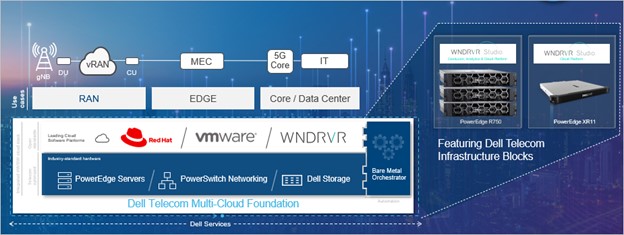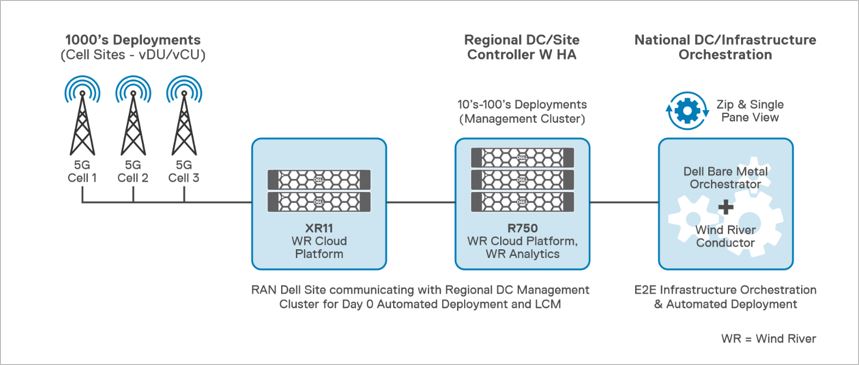This blog is co-authored with Arthur Gerona ,Telco Cloud Systems Architect, Dell Technologies
Communications service providers (CSPs) are on a journey of digital transformation that gives them the ability to offer new innovative services and better customer experience in an open, agile and cost-effective manner. Recent developments in 5G, Edge, Radio Access Network disaggregation and, most importantly the pandemic have all have proven to be catalysts that accelerated this digital transformation. However, all these advancements in telecom come with their own set of challenges. New architectures and solutions have made the modern network considerably more complex and more difficult to manage.
In response, CSPs are evaluating new ways of managing their complex networks using automation and artificial intelligence. The ability to fully orchestrate the operation of digital platforms is vital for touchless operations and consistent delivery of services. Almost every CSP is working on this today. However, the standard automation architecture and tools cannot be directly applied by CSPs as all of these solutions need to adhere to strict telecom requirements and specifications such as those defined by enhanced Telecom Operations Map (eTOM), Telecom Management forum (TMforum), European Telecommunications Standards Institute (ETSI), 3rd Generation Partnership Project (3GPP), etc. Further, CSPs need to operate myriad of telecom solutions including legacy PNF (physical network functions) , VNF ( virtual network functions) and latest 5G era CNF’s (containerised network functions).
Removing Barriers with Telecom Automation
Although many CSPs have built cloud platforms, only a handful have achieved their automation targets. So, what do you do when there are no ready-made industry-standard automation solution? You build one. And that’s exactly what Dell Technologies did with the recent launch of its Dell Telecom Multi Cloud Foundation. Dell Telecom Multi-Cloud Foundation automates the deployment and life-cycle management of the cloud platforms used in a telecom network to reduce operational costs while consistently meeting telco-grade SLAs. It also supports the leading cloud platforms offering operators the flexibility of choosing the platform that best meets their needs based on workload requirements and cost-to-serve. It streamlines telecom cloud design, deployment, and management with integrated hardware, software, and support.

The solution includes Dell Telecom Infrastructure Blocks. Telecom Infrastructure Blocks are engineered systems that provide foundational building blocks that include all the hardware, software and licenses to build and scale out cloud infrastructure for a defined telecom use case.
Telecom Infrastructure Block releases will be delivered in an agile manner with multiple releases per year to simplify lifecycle management. In 2023, Dell Telecom Infrastructure Blocks will support workloads for Radio Access Network and Core network functions with:
- Dell Telecom Infrastructure Blocks for Wind River which will support vRAN and Open RAN workloads
Dell Telecom Infrastructure Blocks for RedHat that will target core network workloads (planned)The primary goal of Telecom Multi-Cloud Foundation with Telecom Infrastructure Blocks is to deliver telco cloud platforms which are engineered and ready for scaled deployments, providing three core capabilities:
- Integration. All components of the platform, including compute, storage, networking, ancillaries like accelerators, and Cloud CaaS software and management tools all are integrated in Dell’s factories.
- Validation. Solution that is engineered and validated with our cloud partners, and that is already proven to work in the field. The engineering and validation process includes detailed test cases across both functional and non-functional aspects of the platform.
- Automation. Solution that is fully automated and that can seamlessly integrate with the Telco’s existing orchestration and inventory systems.
Dell Technologies Telecom Multi-Cloud Foundation meets Telco automation requirements
Dell Technologies Multi-Cloud Foundation provides communications service providers with a platform-centric solution based on open API’s and consistent tools. This means the platform can deliver outcomes based on a unique use case and workload and then scale out deployments using an API based approach.
Dell Telcom Multi-Cloud Foundation enables telco-grade automation through the following key capabilities:
- An open API and workflow approach: All the capabilities of the platform are available as declarative API’s so there is no need to manage each infrastructure component independently, rather open API’s and workflows are triggered via northbound orchestration systems. This capability not only automates deployment but also Day 2 operations and life-cycle management.
- Scalable architecture: The automation architecture is based on a fully distributed and federated architecture so it can scale to 100,000’s of sites
- Data Driven architecture: The automation architecture is data driven and distributed so data can be tapped from edge and regional sites enabling real time use cases and data driven automation.

Automation Use Cases with Dell Technologies Telecom Multi-Cloud Foundation
Telecom Automation is not just about Day 0 (design) and Day 1 (deployment) but should also cover Day 2 (operations and lifecycle management). Dell Telecom Multi-Cloud Foundation supports the following use cases:
- Automated Deployment. It includes fully automated deployment of the cloud infrastructure based on customer specifications
- O-Cloud as Code. It employs declarative automation using infrastructure data, which includes site data, networking, resources, and credentials, to automate tasks independent of the workflow. This de-coupling is important to fully orchestrate the platform.
- Operational fulfillment. Integrations with Wind River Studio Conductor delivers a full set operational tools that provide a single management and observation platform for the operations team creating a unified layer for NOC teams to monitor and manage the platform.
- Staging. The platform is staged in Dell’s factory to reduce the time spent deploying and configuring the system on site and can be tuned in the field using the built-in automation to meet any unique operator specifications.
Dell Technologies developed Dell Telecom Multi-Cloud Foundation and Dell Telecom Infrastructure Blocks to accelerate 5G cloud infrastructure transformation. Our current release of Telecom Infrastructure Blocks for Wind River delivers an engineered and factory-integrated system that comes with a fully automated deployment model for CSPs looking to build resilient and high-performance Radio Access Networks.
To learn more about our solution, please visit the Dell Telecom Multi-Cloud Foundation solutions site.


